Does A CPU Affect FPS? (Detailed Guide).
Everything you run in your laptop is processed by the CPU, together with graphics-intensive video games. And a sooner CPU means higher efficiency and the next FPS, generally.
I emphasize generally as a result of there’s a level of diminishing returns in terms of FPS. Depending in your present system, there’s additionally an opportunity it’s possible you’ll not get an FPS enhance using a sooner CPU. This is because of your GPU.
CPU and GPU work collectively hand-in-hand when producing and rendering frames. So, you want an honest mixture of the elements to have a greater gaming expertise.
Now, let’s additional dive into how CPU-generating frames have an effect on your in-game FPS.
How CPU Affects FPS
In a recreation, the CPU calculates the place of graphical entities like shifting particles, in-game physics, conditional logic, and so forth.
From this info, it generates body knowledge and sends it to the graphics card. The GPU then renders frames using body knowledge and sends it to the monitor. The quantity of body your GPU sends to your monitor is your precise body fee.
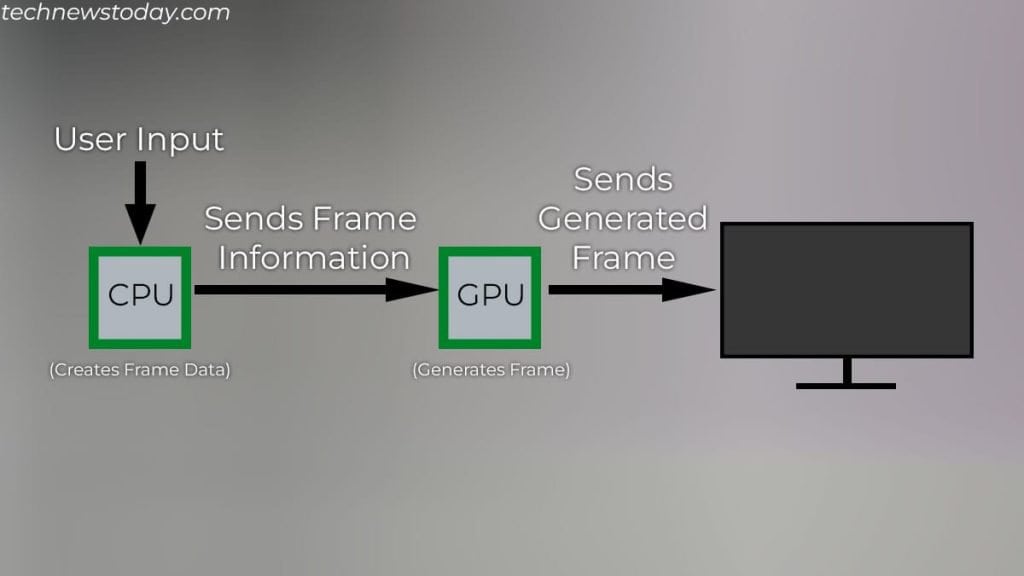
Your CPU tells what’s taking place in a body after which, the GPU attracts (renders) it.
This is why the body fee will depend on the whole body knowledge despatched from the CPU and the body rendered by the GPU.
But do not forget that your monitor doesn’t have an effect on your FPS. So, even when the FPS counter shows larger FPS, you’ll solely see frames as much as your monitor’s refresh fee.
Let’s think about an instance so you’ll be able to image what’s taking place simply.
Say you pair a gradual processor, like an Intel i5-6500, with a considerably sooner GPU, just like the RTX 4090. This means the CPU can not ship body knowledge as quick because the graphics card can render.
In this case, the CPU utilization is probably going at its most utilization whereas the GPU is just not. This ends in the CPU to bottleneck the GPU.
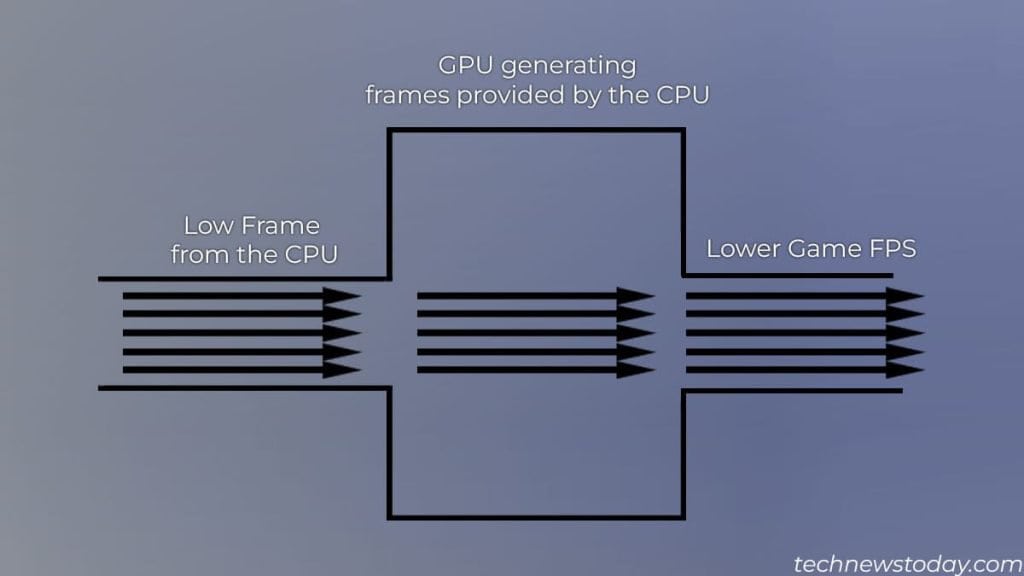
Here, getting a sooner CPU like the brand new thirteenth/14th Gen or Ryzen ZEN 4 processor will considerably enhance FPS.
Now, think about you pair an honest CPU, like an Intel eleventh gen with a low-tier graphics card just like the GTX 1050. Here, the processor can ship a number of body knowledge to the GPU, however the GPU can not render frames sooner.
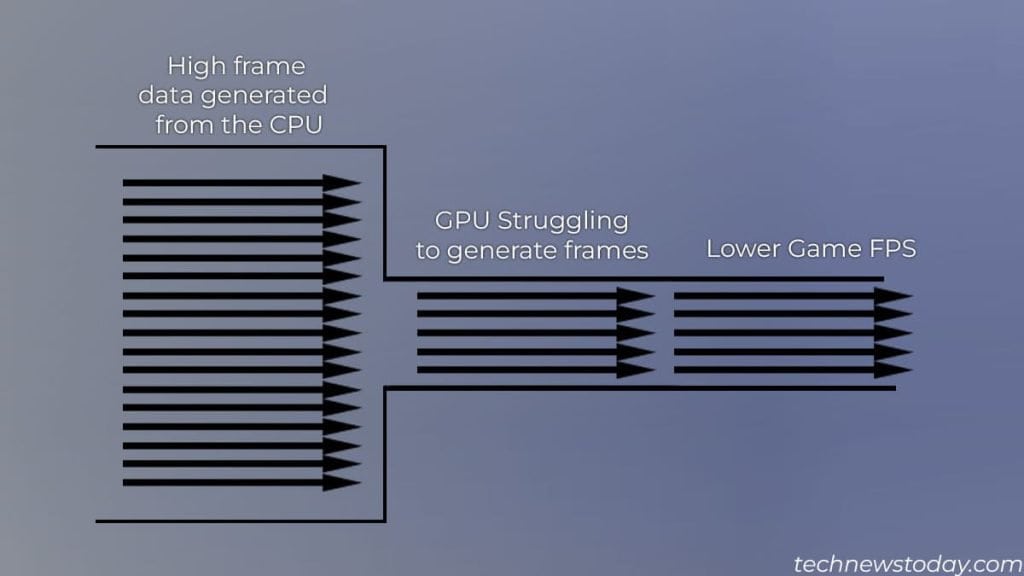
Here, your GPU bottlenecks the CPU. In this case, upgrading the CPU won’t enhance FPS. The concept is to match your CPU and GPU such that the elements don’t bottleneck one another.
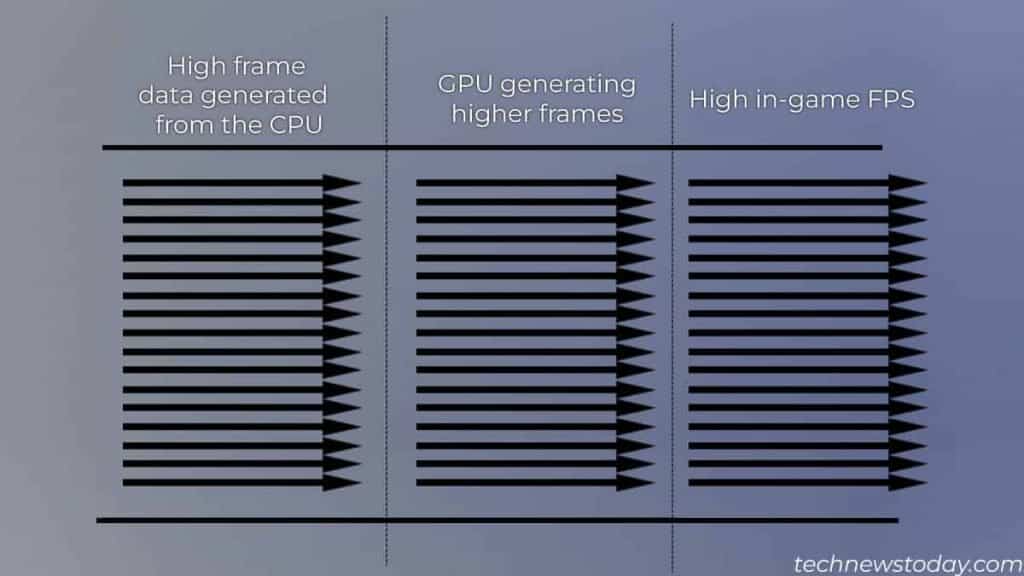
Note: You additionally want a monitor with excessive refresh fee to see more frames.
FPS on CPU Intensive Games
In CPU-intensive video games, the CPU has to manage a number of AI elements and generate and update every entity’s place continually. And if the sport is on-line, this knowledge must be continually refreshed and despatched to the server.
This requires intensive CPU processing. In this case, having a slow-performing CPU can decrease its FPS. So, if you happen to primarily play CPU-intensive simulation RPG or MMO video games, I counsel that you just get a superb CPU.
Fortunately, newer entry-level CPUs and even some older gen can simply deal with most CPU-intensive video games.
This doesn’t imply you’ll be able to run CPU-intensive video games on an entry-level GPU, just like the GT 710. You would require an honest GPU to run these video games at the next framerate.
Where CPU particularly issues is if you find yourself taking part in video games that require excessive CPU utilization on a system with out a devoted GPU.
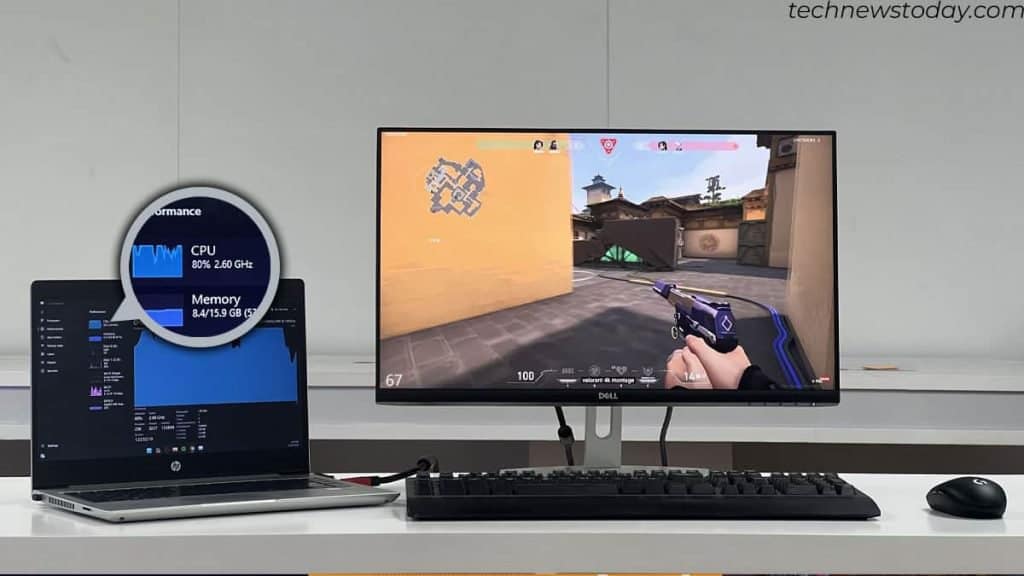
My laptop computer (HP Probook G440 G6) had Intel I5 8265U and ran on two 16GB reminiscence sticks. When working CS and Valorant at 720p, it gave me 60-70 FPS on common.
Upgrading to HP Probook G440 G8 boosted the FPS considerably. Both video games ran on 80-90 FPS at 1080P. The new laptop computer was geared up with Intel I5 1135G7 and eight GB RAM.
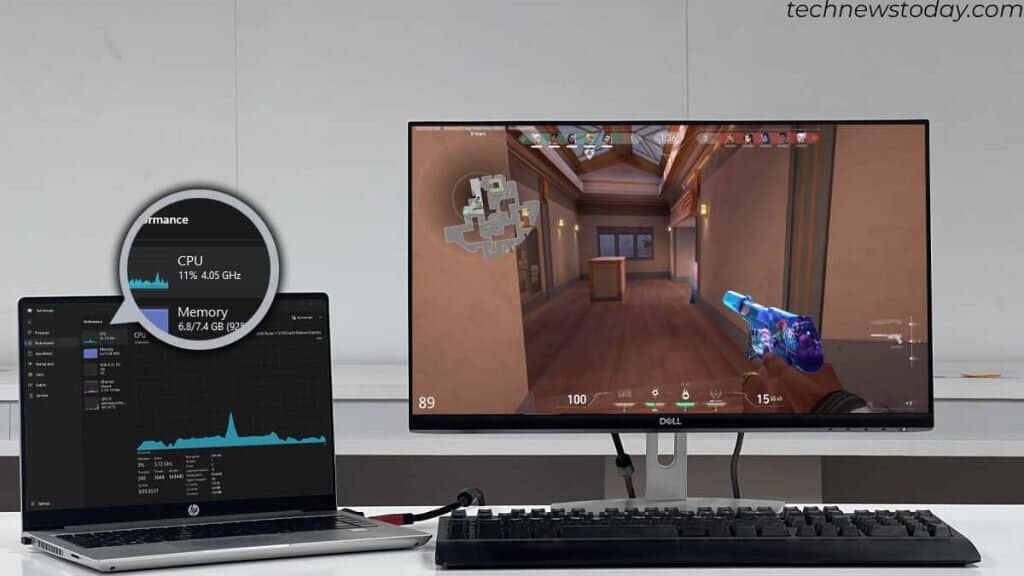
This increase could possibly be as a result of improved built-in graphics on the newer laptop computer. But it’s additionally because of the truth that the brand new CPU ran on the next base frequency.
CPU Specifications that Affect FPS
If you’re in search of a CPU improve, you most likely have checked quite a few processors with completely different specs. If you’re primarily getting a CPU for gaming, I like to recommend that you just test three essential objects on the specification listing.
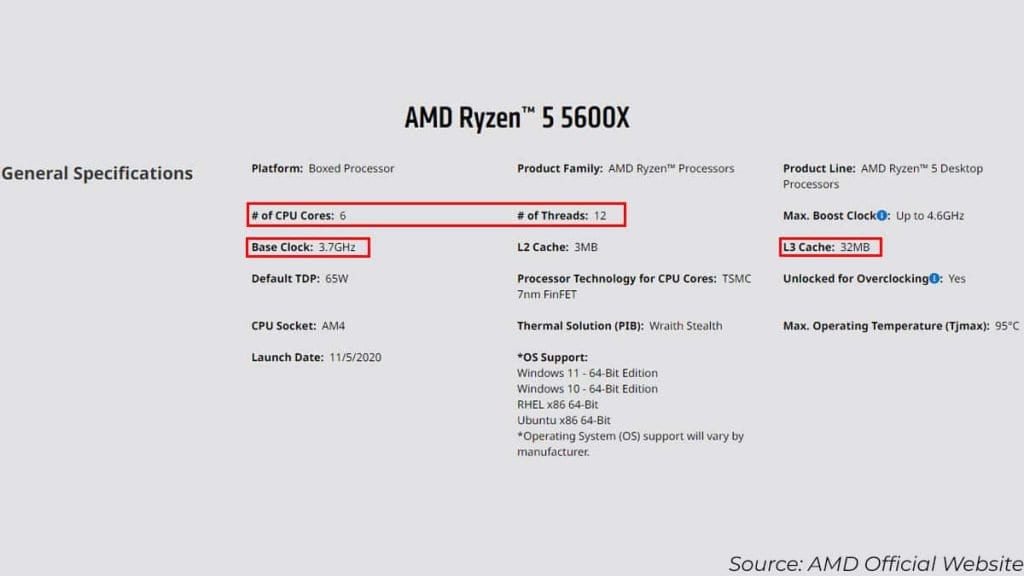
- Number of Cores and Threads
- Cache (L3 particularly for gaming)
- Base clock
In the above lists, the next quantity is best for all. More cores enable the system to run a number of processes concurrently. Similarly, larger cache dimension means knowledge required incessantly is definitely accessible by the CPU.
But more cores and better cache dimension additionally imply larger CPU value. So, in case you are upgrading, I like to recommend that you just make cores, cache, and base clock a precedence.
Note that older video games might not be programmed to make the most of a number of cores. In such circumstances, the efficiency won’t enhance even with a multicore CPU.
Should You Upgrade CPU to Improve FPS?
The CPU utilization often doesn’t max out when gaming. Even CPU-heavy video games often don’t take all of the CPU assets.
So, provided that the Task Manager reveals 100% CPU utilization, upgrading to a more recent CPU will enhance FPS.
A faster-performing CPU means it could generate a number of body knowledge for the GPU to render. So, it’s going to enhance FPS so long as you’ve an honest graphics card.
The decision additionally performs an important function in deciding whether or not you want a CPU improve. You could have heard customers saying that 4K depends more on GPU and 1080p requires a heavy CPU.
Remember that CPU and determination are utterly unbiased. The CPU simply sends the mandatory info to the GPU. The cause customers get a superb CPU for 1080p is to set a excessive most body restrict.
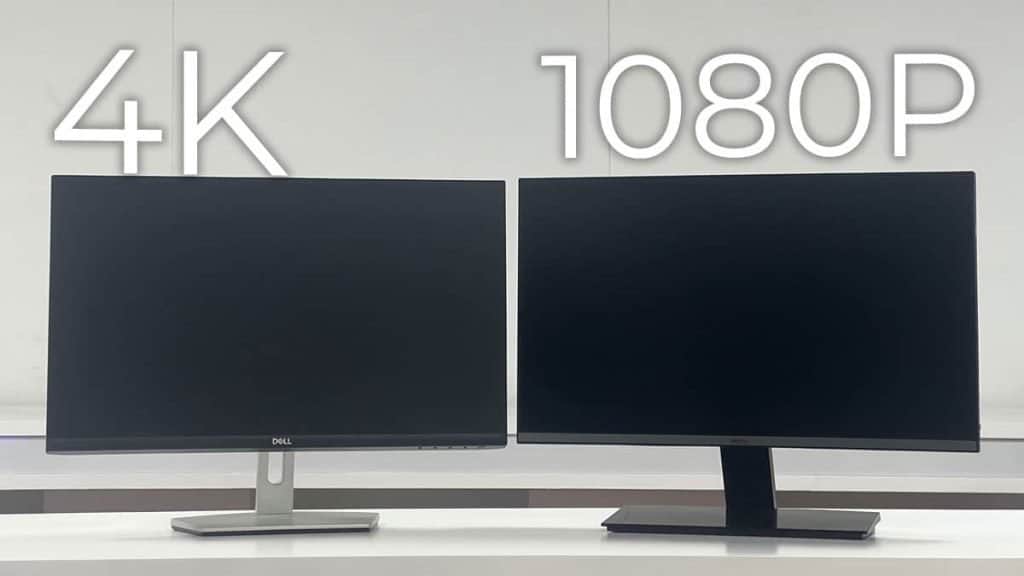
Rendering frames for 1080p is loads sooner in comparison with 4K. So when you have already got an honest CPU, you do not want to fret about getting the quickest GPU. Most mid-tier graphics playing cards can simply deal with 1080p.
On the opposite hand, gaming on a 4K display screen means the GPU must render a considerably larger variety of pixels. So a high-end GPU is a should if you would like more FPS on larger decision. But this doesn’t imply you will get a low-end CPU.
You want an honest CPU however even higher GPU if you happen to plan to recreation in 4K. If you recreation on 1080p, it’s a good suggestion to have a superb CPU with an average-performing GPU.
I additionally did the identical with my latest PC improve. I largely play on a 1080P 24” monitor using an AMD RX 6650 XT. But the CPU I had was a Ryzen 5 2600. The system continually bumped into most CPU utilization.
This allowed me to conclude that my CPU was bottlenecking. I upgraded my CPU to a Ryzen 5 5600x and noticed a major FPS increase.
Now, if I ever need to recreation on a 4K monitor, I would want to improve my GPU as effectively.
Final Thoughts
CPU positively impacts FPS! But whether or not upgrading will enhance FPS relies upon totally in your setup and the video games you play.
If you’re questioning whether or not you want a CPU improve, I like to recommend checking your CPU utilization when gaming. If the CPU temperature and utilization are continually excessive, I counsel you improve your CPU.
You may even must improve your motherboard as newer CPUs might not be suitable.
Check out more article on – How-To tutorial and latest highlights on – Gaming News
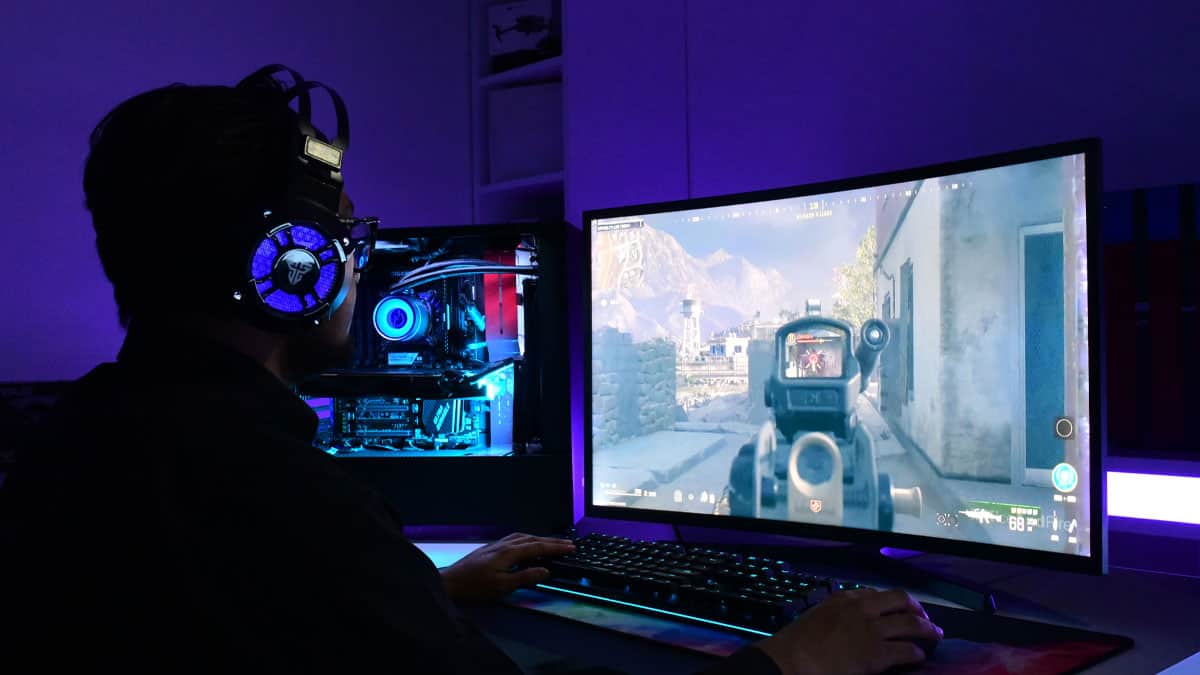


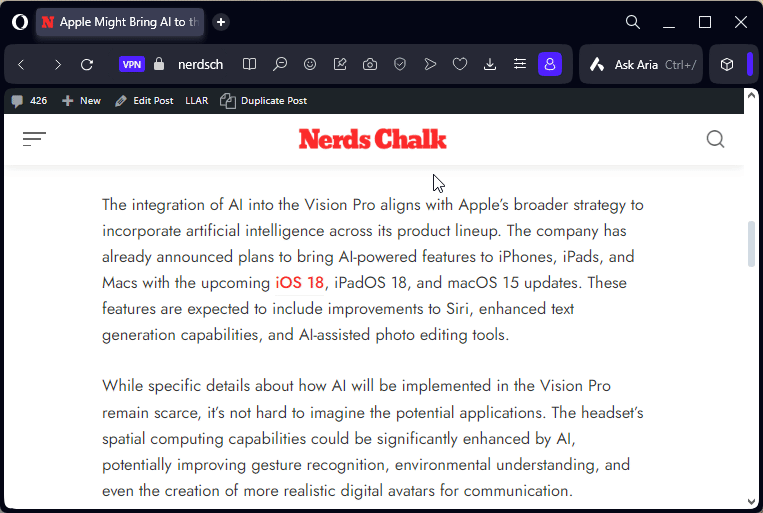

Leave a Reply